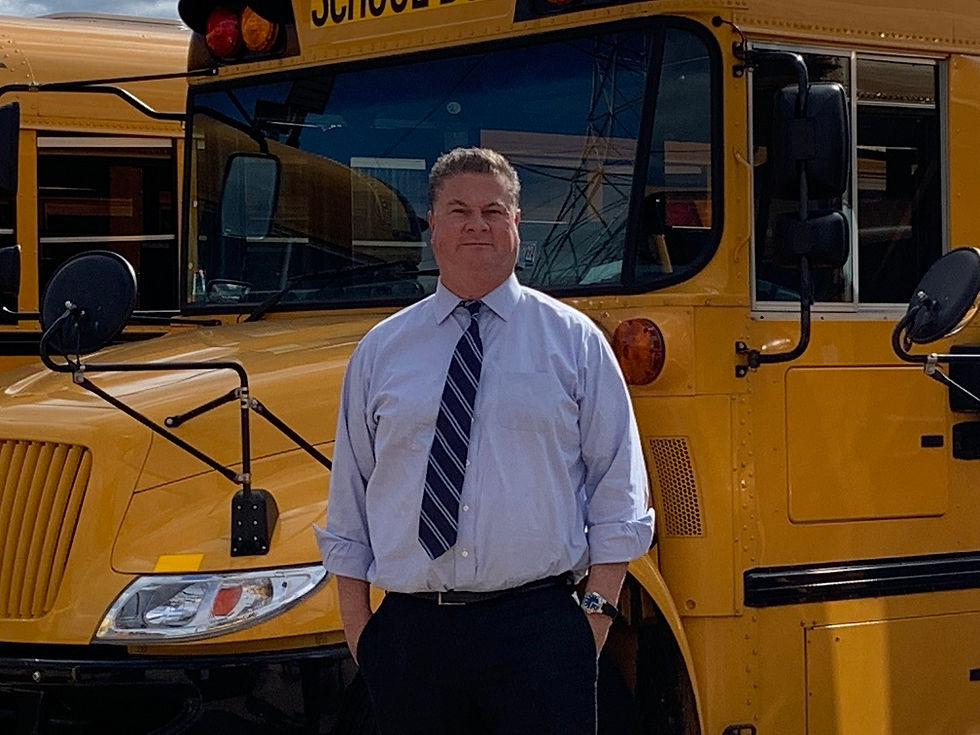Nationally recognized fleet leaders named ‘Biodiesel Ambassadors’
- The National Biodiesel Board
- Jan 17, 2022
- 3 min read
When John Benish Sr. began ferrying children to and from school on his iconic yellow buses in 1958, the Space Race had just begun, and Elvis Presley topped the charts. Six decades later, a lot has changed for John Benish Jr., the second-generation executive of the family-owned and operated school bus company based in Oak Brook, Illinois. For one thing, today’s kids have clean-emission buses to ride on—with biodiesel playing a big role.

Benish Jr., who serves as president and chief operating officer of Cook-Illinois Corp., the sixth-largest school bus contractor in the U.S., began powering his fleet of more than 2,200 school buses with biodiesel blends in 2005.
“The day we began using biodiesel, we began reducing harmful emissions immediately, with no modifications needed to our buses,” Benish Jr. said. “For us, safety and reliability are everything. With biodiesel, our feeling is why not use a fuel that's better for our engines, better for the students and supports Illinois farmers?”
In neighboring Wisconsin, Mahanth Joishy is of singular mind and mission. He wants to help the thriving city of Madison, Wisconsin, become one of the most sustainable cities in the world—with biodiesel at the heart of the effort. When Joishy became the city’s fleet manager in 2017, one of his first acts was to switch the city’s heavy-duty fleet of about 500 vehicles to blends of biodiesel fuel.

“We are not powerless in facing climate change, which is a threat not just to Wisconsin, but to the world,” Joishy said. “We can choose to take action by using better technologies and fuels, including biodiesel. Our community wants this and demands even more.”
As the National Biodiesel Conference & Expo prepares to kick off in Las Vegas, the National Biodiesel Board announced that both Benish Jr. and Joishy have been named Biodiesel Ambassadors. The program, supported by the United Soybean Board and soybean checkoff, cultivates a handful of volunteer spokespeople and mentors who are considered top biodiesel thought leaders.
Under Joishy’s leadership, diesel vehicles, from fire trucks to parks department mowers to the all-important snowplows, now run on up to a 20 percent biodiesel blend (B20) most of the year. The city is even retrofitting 17 fleet service vehicles to run on 100 percent on biodiesel fuel (B100) year-round. That’s thanks to a project of NBB, the Wisconsin Soybean Marketing Board, Optimus Technologies and biodiesel producer Renewable Energy Group.
Joishy first found a commitment to biodiesel in New York City, where he worked for 16 years in government operations. That included New York City Department of Parks & Recreation, an early adopter of B20. The department helped pave the way for the entire city’s massive expansion of the use of biodiesel for city vehicles and Bioheat® fuel for heating buildings.
“I knew if New York City could commit to biodiesel, so could Madison,” Joishy said.
In Illinois, under Benish Jr.’s leadership, his company was the first to voluntarily switch an entire bus fleet to blends up to B20. He is also an inaugural member of the B20 Club of Illinois, a partnership of the American Lung Association and Illinois Soybean Association that recognizes and supports Illinois-based fleets committed to using B20 or greater blends. Benish Jr. is past president of the National Student Transportation Association.
“It’s exciting to see the soybean meet the city in this way,” said Lynn Rohrscheib, a soybean grower from Fairmount, Illinois, and a USB director. “It feels good knowing that when the oil from my soybeans gets made into biodiesel, it’s reducing carbon and improving air quality for students and other residents in Chicago.”
Biodiesel reduces greenhouse gas emissions by an average of 74 percent. Studies show it can also reduce health threats like cancer and asthma attacks, as verified by a 2021 health study.
Made from an increasingly diverse mix of resources such as recycled cooking oil, soybean oil and animal fats, biodiesel and renewable diesel are better, cleaner fuels that are available now for use in existing diesel engines without modification. NBB represents the entire biodiesel and renewable diesel value chain, including producers, feedstock suppliers and fuel distributors.
The National Biodiesel Board is funded in part by the United Soybean Board and state soybean board checkoff programs.






















-RKstandin.jpg)
_gif.gif)




